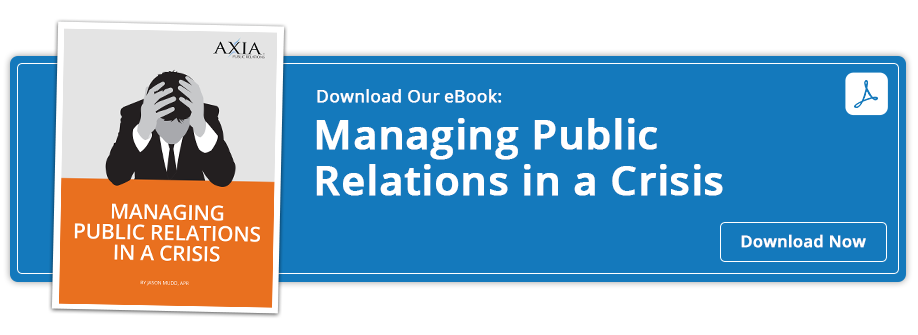 Planning proactively for potential crises with 3 key strategies
Planning proactively for potential crises with 3 key strategies
Lately you can’t turn on the television, log in to social media or pick up a newspaper without noticing a company’s public relations crisis unfolding. We have all seen what happens when a company isn’t prepared for an unexpected situation. It spirals out of control and creates a media storm of negativity. Your company can’t always prevent a bad situation from happening, so the more prepared you are, the better skilled you are to handle unforeseen circumstances. Preparation can quickly turn a negative situation into a positive outcome.
- Build a loyal internal audience.
A strategic public relations plan involves key areas of reputation management, corporate social responsibility, social media and measurement. It’s important to start with your internal audience, including employees, board members and shareholders. Everyone involved in the organization should know your company’s mission and core values. Employees should know what the company stands for and what differentiates your brand from others. Giving employees a sense of ownership encourages them to be brand ambassadors.
- Be proactive.
With the widespread use of social media, any person can be a citizen journalist and easily broadcast content to the world. A short video filmed on the spot becomes reality for the viewers – even if the whole story isn’t included. It’s important for you to proactively share your company’s brand story, including who you are, why you do what you do and how you bring value to your customers. Creating and publishing content that’s valuable to your audience is key. Consistently generating positive content via multiple communication channels and addressing concerns as they arise will benefit your online reputation. If your audience perceives you as a good, socially responsible organization, they’re less likely to fall prey to negative naysayers.
- Be honest.
Maintain the old adage that honesty is the best policy throughout any crisis situation. It’s important you share with your chosen audience – be it shareholders, employees or the media – what you know about the situation at hand. Your spokesperson will lose credibility if he or she appears to be hiding any information. Communicate how your company feels by showing concern and empathy. Take responsibility by stating exactly what action steps will follow and do them.
The best defense during a time of crisis is a good proactive PR plan. Download Axia Public Relations’ e-book Managing Public Relations in a Crisis to learn how to choose a spokesperson, six things you must never say and how to respond to hostile media.

 Karen Schexnayder is a marketing and communications professional with nearly 20 years of experience where she created compelling content for the real estate development, construction, manufacturing and retail industries. Karen serves as the president-elect and chairs the marketing committee for the Nassau Education Foundation, which supports the Nassau County, Florida, School District. Connect with Axia on Twitter @axiapr or tell us what you think in the comments below.
Karen Schexnayder is a marketing and communications professional with nearly 20 years of experience where she created compelling content for the real estate development, construction, manufacturing and retail industries. Karen serves as the president-elect and chairs the marketing committee for the Nassau Education Foundation, which supports the Nassau County, Florida, School District. Connect with Axia on Twitter @axiapr or tell us what you think in the comments below.
Featured image credit: 123rf.com
Topics: public relations, crisis communications


Comment on This Article